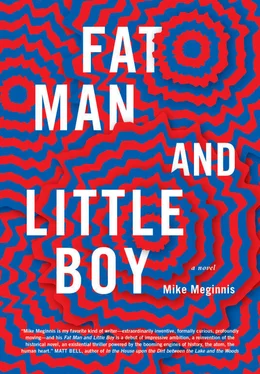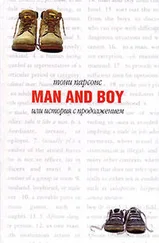He nods.
“I shouldn’t ask you what the medium was on about,” says Rosie. “You’re too young to be guilty of anything, aren’t you?”
“I guess.”
“What are you afraid of? Are you hungry?”
“Yes.” He glances up.
She cuts her sandwich in imperfect halves and gives him the smaller portion. He keeps his broom upright as he takes his share.
“Do you drink coffee?”
“No.”
“I think what she did to you was awful. Very rude. You paid for a ticket the same as anyone else.”
“Yes ma’am.”
“Is your brother here?”
“I misspoke, ma’am. John is my uncle.”
“Of course. Is your uncle here? You are both American?”
“Yes. He washes dishes in the kitchen.”
“That’s perfect. But he speaks French?”
“Some.” He finishes the roast beef, licks his finger, collects breadcrumbs from the table.
Rosie asks if she can speak to Matthew’s uncle John. Matthew says no, John is washing dishes in the kitchen and he has to get back to sweeping. She asks him what about the sandwich half she gave him. He takes his dustpan from the table.
“I liked the half sandwich.”
She asks him if he goes to school.
“It’s mandatory.”
She sighs. “Can I speak to your uncle?”
“He’s doing dishes in the kitchen.”
“My husband died freeing this country,” says Rosie. “He was hanging by his parachute in a tree and they shot him full of holes. I came here to start an international hotel and learn four languages. If there were more international hotels and everyone knew four foreign languages my husband would still be alive today.”
“I’m sorry,” says Matthew.
Rosie is not convinced. The little boy goes back to his sweeping. She considers another cigarette but at that rate it would be four a day—two at lunch, one at six, one before bed—and though this inevitably will happen, and worse, she can’t afford that kind of habit now. She would have to go without breakfast.
“Well I can go to the kitchen,” she says.
Here is the fat man John at the sink. He attacks the dishes as if he means to grind them down to dust. He’s humming unfamiliar tunes in his deep rumble as he struggles not to bite his cigarette in half.
Rosie offers her hand. “Rosie Cummings. Hotelier.”
John’s eyes are darkly, deeply ringed, one side of his face marbled with bruises from his fall. “Good to meet you, Rosie. As you can see I’m occupied.”
She insists on her hand. He holds up his and says, “I’m filthy.”
“My husband was killed by Nazis freeing this country,” says Rosie. “He was hanging by his parachute in a tree and they shot him full of holes. I have come here to start an international hotel and learn four languages. If there were more international hotels and everyone knew four foreign languages my husband would still be alive today.” She pauses. “John, please shake my hand.”
He wipes a mitt on his apron, front and back, and again, and again. It’s the wrong hand—she changes hers to accommodate him, and they shake. His grasp is as loose and soft and warm as half-baked dough. His eyes are deep set, dark and sweet like raisins.
“My name is Rosie Cummings. Please listen to me.”
“Were you at last night’s séance spectacular?”
“I was. I told your nephew Matthew how I thought the medium was very rude to you.”
John shows her his hands again. This time she notes their blackness—apparently not a layer of grime, as she had assumed. “Well she accused that other woman of infanticide,” he says. “I guess it’s that kind of show.”
“To say nothing of what she said to me. Of course, as she conceded, sometimes the dead are wrong. In my case they would have to be, so I’m sure they’re wrong about you as well. You don’t look like a guilty man.”
He goes back to his dishes, scraping with his cloth and nails, turning up the water until steam rises in thick plumes. He takes the unlit cigarette into his mouth and pushes it back out, and chews. “Do you find yourself a good judge of character in general?” he says.
“You never know,” says Rosie. She fingers the zipper on her purse.
“Then I won’t take your word on it.” He turns down his eyes. The conversation is over.
“There’s a place called Gurs,” says Rosie. “You need to see it with your own eyes. I think you’re going to love it.”
“Gurs,” says John.
“It was a prison. But not the way you think of them—not like back home. More a lot of little huts, and this tiny fence you could jump if you wanted. You know, with razor wire and all that, not electrified, but I’m going to take that out. I’m going to make it a hotel.”
“A hotel.”
“Yes, my first international hotel in what will one day be a chain. If everyone learned four foreign languages, then my husband would still be alive. I want to make the prison into a hotel so people will be able to move past all the unpleasantness.” She whispers, now. “That’s where Vichy kept the Jews before they were shipped out.”
“Jews?”
“Before they shipped them out to Germany.”
“What happened to them? Were they hurt?”
“Well, they didn’t come back.”
Rosie explains that she has been eating at every reasonable restaurant and staying at every decent hotel she can find on her way south, where she is going to convert the prison into the first of many international hotels. She says there will be language classes, and everyone who stays there will learn four foreign languages, and then people won’t lose their husbands with such awful regularity. She explains she has been eating and staying at so many places because she needs to find staff for her first hotel, good staff with a command of several languages. At least two. Maybe he would like to work for her, she says.
“Which languages?”
“Four foreign languages should be enough, in the long term, to prevent the most bloodshed.”
“Which four?”
“For instance, we would need to learn Japanese, German, French, and Spanish.”
“Not Italian?”
“I don’t think we’ll have to worry about them getting into any more trouble. But there is always Mexico to consider.”
“Yes,” says John, puzzled. “Always Mexico.”
“So would you like to come work for me?” says Rosie. “I’m sure I can pay a little more than this café, and you would be able to do many interesting tasks, and not only wash dishes.”
John says that he can’t leave, that he has only just settled down, that he only knows one foreign language, not four. Rosie asks him is he sure he can’t be persuaded. She says he can do the dishes at Hotel Gurs if he likes it so much.
“No, no,” he says. “No, I’m sorry.”
She turns to leave. He grabs her shoulder with his muck hand. His raisin eyes shine brightly. “Wait. Is it true you’re barren?”
Fat Man tells Francine the news over breakfast. “We’ll leave tonight,” he says. “This is an excellent opportunity, I’m sure you’ll agree.”
“Of course,” says Francine. She bites through her buttered toast. Her hand reaches across the table and rests on his. Warmth passes between them. She touches her tummy and circles the swell. Fat Man can feel her pulse in the tips of her fingers. “If you need anything, you can send me a letter.”
“And you can do the same.”
Francine smiles and nods as if there is the slightest chance that she would want to see him again, that she would need his help, that he could ever do anything for her. He wants to tell her how beautiful she is. He wants to ask her to leave her husband, who is not in any case the father of her babies. He wants to grasp her by the shoulders and shout, “Those are my children inside you!” His, and his brother’s.
Читать дальше












